#fe tertiary
Explore tagged Tumblr posts
Text
ignoring function VS demonstrative function in socionics (5th function vs 6th function in mbti)
this is super useful for differing entps from intps, enfjs from infjs etc. for example, extps are TE demonstrative. they won't have any problems TE scolding you (critical parent in john beebe's system) or taking initiative and telling people what to do.
for ixtps on the other hand TE is ignoring function. an intp or istp will try to lead only when absolutely have to. why you ask, prove it you say? well, the reason why ELSE because extps are also fe tertiary while ixtps are fe inferior. ixtps do not want to deal with people.
more proof you say? well, fe tertiary for extps means fi blindspot. if your fe is trolly as an extp then your fi is gonna be worse as its shadow. extp do not give a dang about your feelings or AT LEAST, extps do not give a dang about your feelings when they clash with the logic. isn't this still good enough reason for you why extps can order people around with their te (or fe) while ixtps can't or at least won't?
socionics puts ixtps and their fi in the "role" slot. role function tries. ixtps tries to be nice. if you have some ixtps friends you will see this, you don't need a complicated 89 dichotomy based system whatsoever. whenever ixtps hurt people with their logic, they do it by mistake only.
#16 types#socionics#mbti#personality types#jungian typology#entp#intp#istp#estp#fi polr#fi blindspot#fi role#te demonstrative#te ignoring#fe tertiary#fe child#fe inferior#fe suggestive
11 notes
·
View notes
Text
Anon wrote: Hi! 18 y/o ENTP here! I’ve always wondered about the role that culture plays in personality development. In my case, I came and know people from cultures where security is highly emphasized (the East Asian and southeast Asian kind, to be more precise) , and it seems like people have suppressed their natural tendencies very well to fit in in order to maintain survival needs , to fulfill their desire for status and well, “face”. I am personally not very adept at these and I eventually convinced myself that these people probably made a lot of unnecessary sacrifices just to live a life that is socially acceptable. Yet knowing that I am just terrible at meeting expectations, i suspect that my ability to adapt to my environment is just pathetically low hence my opinions are not justified. Security is important, no way I can refute against that.
Can oneself change their orientations just to meet the demands of their environment? I am aware that it is not often the case, but I feel like the way such theory may apply differently in more collectivistic cultures, at least from what I’ve observed. There’s indeed a lot of people who deviate from their original self, and they think it is constructive even though their way of thinking is just elitist and doesn’t take account for nuance. It almost seems like the end goal of self-improvement is to fit some idealized community image while tooting their own outstanding qualities (which is ironic, we all know they just wanted to play safe) and save for retirement. Or maybe, i wouldn’t be thinking of this if only I could’ve done what my parents , institutions and corporations expected of me. Things would’ve been less complicated if I tried to suck it up and become that doctor or lawyer that everyone respects. Life would’ve been so much easier when you are in line with society instead of sticking out like a sore thumb. And that is the kind of thing i wish would stop happening to me even though I don’t see the point of doing what everyone does (since that invites more competition and workplace toxicity which i cannot cope, obviously)
Should I stop caring so much about fitting expectations by attaining absolute job security as the end goal, or my self-improvement has to align with a value that is universally important but difficult to achieve? If i go with the first one, it almost seems like I am trying to escape from putting in effort to work with the second option, but going with the second one could leave out other interesting options to live a life that could be equally fulfilling.
---------------------
There are several problems/errors in your thinking because you're conflating many concepts that need to be understood separately:
(1) Oversimplistic View of People
The key point isn't about personality but about values. It doesn't matter the personality type, values play a major role in guiding one's future direction in life. It sounds like you haven't done enough to clarify what your values are, which means you are likely to struggle with making good decisions and finding good direction. What happens when you lack strength and conviction in your own values? The void within is easily filled by external forces.
The void is YOUR problem and it is YOUR responsibility to address it. By blaming external factors like parents or society for pressuring you, you are deflecting responsibility. What this does is set up an attitude of "me vs world". Eventually, the inner conflict morphs into an outer conflict, and you start treating your parents and society as "enemy". It's then easy to irrationally believe that your existence, freedom, individuality, etc, is under constant threat.
When you approach life with a "me vs world" attitude, you are always on defense and come across as combative right out of the gate. This doesn't encourage people to listen to you and understand where you're coming from. While it is true that not everyone is capable of reasonable discussion, you're not going to find out who is or isn't as long as you don't give people the benefit of the doubt.
You seem tempted to adopt an "individualist" mindset to justify going against cultural expectations, but there are significant disadvantages to it. When you focus too much on the individual, it's easy to fall into the trap of blaming individuals for larger social forces that are beyond their control. Culture doesn't just appear out of nowhere.
For instance, East and Southeast Asian countries are populated with people who have been directly impacted by some very extreme and traumatic historical events. It is an appropriate and reasonable response to value security because of it. You are lucky to be born in a generation where security is possible, which means you are among the most likely to take it for granted.
Life is difficult for most people. The majority of us, not born to great wealth, have to make difficult calculations, concessions, and trade-offs in order to obtain what we need from society. Society intersects with personality insofar as different personalities value different things and will thus make different decisions about what aspects of culture to accept or reject.
Having conviction in your values requires you to apply them fairly and consistently. If you hope for people to be accepting of the difficult choices you have to make, then you should be the first to accept the choices they have made. While I recognize your attempt to see the other side of the issue, you haven't reached a full understanding, so you aren't capable of genuine acceptance yet. You still speak about their decision to "conform" with disdain, as though it is a lesser choice that makes them lesser people. Be warned that having a shallow view of people contributes to feelings of alienation.
Acceptance is much easier when you're mature enough to realize that: 1) people are complicated and you shouldn't rush to judge when you don't understand their full experience, 2) what other people do is none of your business, and 3) other people's opinions should only inform yours when they are valid opinions, and validity isn't always easy to determine.
At the end of the day, while you should consider outside opinions, the values you hold have to be chosen by you. The reason you are easily triggered by outside opinions/expectations is because they are exposing the truth of your void within. When you have a deeper psychological issue that remains hidden or you refuse to address it, you end up becoming hypersensitive to any mention of it. If you don't want to be hypersensitive, then the answer is to stop blaming and face the problem head on within yourself.
You seem to want to contrast yourself with your culture by claiming to care more about individual choice, but you can't claim to be an individual when you don't know your own values. As long as your values are unclear, you are in a poor position to advocate for yourself. How can you persuade others to be sympathetic to your perspective or convince them that you are capable of making good decisions when you can't articulate why your values are important and worthy of upholding through your life decisions?
No parent wants to see their kid miserable. Can parents, especially Asian parents, be pushy, bossy, and overbearing? Sure. However, if you meet their pushiness with adolescent rebellion, you won't get far. Culture aside, any normal parent wants to see that you have a good head on your shoulders before they trust you to make big decisions for yourself. If you're able to approach them as a capable adult who takes life seriously, you might find them much more amenable to discussion.
An important aspect of learning how to use Fe properly is to realize that you have a big influence over how social interactions proceed, so learn to wield that influence wisely. But this isn't possible as long as you always see yourself as a victim of outside forces.
(2) Oversimplistic View of Society
What your parents expect of you may or may not overlap with societal expectations, however, one should not simply assume they are the same. From a Jungian perspective, parents often act as a stand-in for understanding society. However, how can two individuals adequately represent an entire society made up of thousands or millions of people? They can't. This would be an illogical leap. At best, your parents represent only a few aspects of society as a whole.
Of course, you don't only see society through your parents. You also have peers, friends, school, or work experiences. However, keep in mind that people tend to segregate themselves based on factors such as class, race, ethnicity, religion, educational attainment, common interests, etc. It is very likely that the people you've been exposed to outside of family are very similar to your parents with regard to the above factors. Therefore, it is still only a small sliver of society you are seeing.
Of course, you also learn about society through media. However, media companies are mainly interested in making money rather than providing a realistic, nuanced, and comprehensive view of society. What makes money for them? Lowest common denominator stuff; images that appeal to the simplest and often basest aspects of human nature. It is not only a small sliver of society being presented here, but a heavily distorted view of it as well.
All of this is to say that, with the little life experience you possess at 18, what you think you know about culture and society is extremely limited. You feel constrained by this thing called "society" and don't realize that what you're actually being constrained by is your own oversimplistic or distorted idea of what society is.
You are clashing with your parents and you've extended that clash to society, to the point of believing that the world is antagonistic toward you. This sort of thinking is emblematic of the adolescent drive toward independence. But society is an abstract concept; it is not a conscious entity that is capable of expecting things from you in the same way a parent does.
When you have a "me vs world" attitude, it's easy to trap yourself in the position of victim, rather than see yourself as an agent of change. If you were to confront every real person in your life who expected something unreasonable from you and resolved those differences as constructively as possible, it's likely that the antagonism you feel from "society" would disappear.
In other words, this problem is to be resolved in the realm of the practical, in your actual relationships. Thinking about the problem through sweeping overgeneralizations about "society" at large doesn't help because it just makes you feel lonely, cynical, and, eventually, depressed.
(3) Oversimplistic View of Culture
As part of your overgeneralizing, you seem to be conflating culture and society; they aren't the same thing. Society refers to a large group of people that are held together by some kind of commonality. Culture refers to a specific set of beliefs, values, norms, and practices that a group of people share and honor. Culture is more related to ethics, in terms of prescribing what is/isn't acceptable behavior.
A society can contain several different cultures and subcultures when there is a higher level of commonality to link them together, such as nationality. Perhaps you haven't realized that society is big enough to house a variety of cultures. Maybe you have to look harder for your kind of people or create a community better suited for yourself.
Calling cultures "collectivist" or "individualist" is actually one of my pet peeves because of how it leads people to stereotype or make insulting assumptions. It is important to note that this terminology was coined by western intellectuals, some of whom had obvious prejudices against any "eastern" peoples living east of Germany. Also, contemporary research has not been able to find compelling evidence for the distinction except when using the most extreme cultures for comparison. In other words, these are outdated concepts. There are newer and more useful concepts available.
Yes, it is a fact that some cultures place more pressure and perhaps even try to coerce members into conformity. However, calling this kind of culture "collectivist" is misleading. It doesn't account for how people really feel, deep down, about the pressure. Go to a "collectivist" culture and you'll find plenty of people who are critical of it or even openly rebel against it. Go to any "individualist" culture and you'll find plenty of people who spend a lifetime conforming to mainstream standards. What does this tell you?
We are all individuals. As an individual, you have a choice to make about the degree to which you subscribe to and participate in your culture. And I use the word "degree" very intentionally because you seem to have trapped yourself in a false dichotomy.
Thinking in polarized either/or terms is a sign of intellectual immaturity at best and intellectual dishonesty at worst. It hampers good decision-making and can even lead to helplessness because you lose access to the full range of possibilities available to you. The choice does not come down to either: individual or group; respectable or shameful; security or poverty; etc. Most people actually live life with more nuance than that. You accuse others of lacking nuance but you are the same.
You're living through a rocky time of transition between adolescence and adulthood. The brain doesn't reach full maturity until around 25. Eighteen-year-olds still suffer from certain childish thought patterns. Children have a very small and narrow understanding of the world, only concerned about whether the world brings them pain or pleasure. However, as you grow up, you should start to realize more and more that: 1) the way the world works is much more complicated than simple dichotomies, and 2) your subjective experience is not necessarily representative of the larger objective world.
(4) Oversimplistic View of Economy
In 2024, there's no such thing as "absolute job security". And it's not the case that every job can be easily sorted into either "stable" or "unstable".
As an example, I live in an area that has traditionally been great for computer science and engineering. Many members of my immediate and extended family are engineers and I was pressured to become one. For the longest time and even now, both of these careers were touted by all parents and teachers as foolproof, always secure. But that is not the case today. The economy has changed and these jobs have been disappearing or moving to more favorable places. Today, every job opening has hundreds of applicants and even those with advanced degrees find themselves unemployed.
What this should teach you is that the work society considers to be valuable changes over time in accordance with economic shifts and needs, but the culture doesn't necessarily keep up with those changes. Once upon a time, business people were looked down upon as dirty, greedy, and selfish. But now look at all the people in Asia clamoring to get a business degree.
To be aware of economic changes, let alone try to predict them, requires expertise and imagination most people don't possess. That is why all they can do is stick to what is known or what has worked in the most recent past. Unless you live in North Korea, nobody knows for sure which direction the economy is going to go. It's not something within your control. However, you can learn enough about it to make some good guesses and take smart risks. You can take time to research the full range of career possibilities open to you and make an informed decision.
The more useful question to ask is: Are you able to find or create work that the economy values enough for you to build a fulfilling life? It is largely irrelevant what the culture thinks about it because they are always behind the curve. What matters most is whether you can contribute/create something valuable given the socioeconomic conditions you live under.
.
Opinions are just words; they need not mean anything unless you ascribe meaning to them. Everyone has an opinion but not all opinions are equally valid. If you want to make good decisions in life, you shouldn't be easily swayed by every opinion thrown at you, rather, you should only be swayed by opinions that are backed by solid expertise and evidence - this is what Ti development should help you with. In the end, the results will speak for themselves.
However, if you can't get over the adolescent mindset of reflexively rebelling against "expectations", you will always be overreacting to every opinion that comes your way (which is a recipe for getting stuck in tertiary loop). Even if you end up choosing a so-called "secure" career, the underlying inability to carefully analyze and evaluate the quality of the opinions you encounter (i.e. underdeveloped Ti) will nevertheless result in an unstable life.
#entp#auxiliary ti#tertiary fe#career#society#culture#values#adolescence#parent child relationship#alienation#cynicism#false dichotomy#critical thinking#ask
12 notes
·
View notes
Text
At the end it's not for winning it's just to just put him in the game it's ridiculous at this point
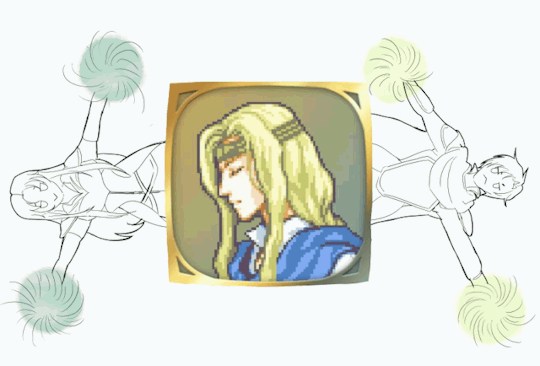
I felt like this is why I study animation and storyboard... to make weird gif about one of the prettiest men of the whole Fire Emblem franchise...
Pls vote for Elffin, I need him in this game.
#fire emblem#fire emblem heroes#fe elffin#cly8#choose your legends#Why he's still not there?#Like he's important he's not a tertiary unit#I will get so broke when they'll add him tho
8 notes
·
View notes
Text
I will always remember the day I was explaining my uncle why I typed him as an ENTP and when explaining his functions he said "oh no I think i'm way more this Ti thing than the Ne thing INTP makes more sense to me"
and he kept disagreeing with me for like half an hour AND HE KNEW NOTHING ABOUT MBTI WHILE I KNEW A LOT AND KNEW WHAT I WAS SAYING
and that whole discussion just showed me why i was exactly right in typing him as an ENTP
#the fact he knew nothing about it but needed to see how “right” i thought i was just show his Ti and Fe are auxiliar and tertiary#like his Ti-Fe were dancing with each other at that time#his Ti wanted to question me for it to make logical sense to him and distrust other person opinion (Ti>Fe)#while his Fe wanted to interact and question so he could see my way of viewing him#(also my reactions and if i could maintain my point of view)#like wow uncle the way you're trying to prove me how INTP makes more sense to you just shows me how much of an ENTP you are#INTPs use inf Fe they wouldn't be willing to listen to me bc that would kill their Ti#their own way of how things work (including how “they” work) is the most important thing to them#if he was an INTP he'd criticize me and show every evidence (Ti-Si) of how wrong I was#ENTPs will always prefer questioning first#INTPs wouldn't QUESTION you they right off the bat disagree with you bc Ti dom-Fe inf#other people's opinions being CORRECT will kill their Ti and they don't want that#ENTPs use tert Fe they LIKE the challenge of someone disagreeing with them#they don't oppress their Fe they LIKE knowing about other people#also by being Ne doms they really like new ways of seeing things#THEN they will use Ti to see if it fits their internal logical system#and they might even ignore it (Ne-Fe loop)#that's why ENTPs are seem as argumentative they really like questioning people and their views#having someone disagree with them will make them want to know why you think so#INTPs having someone disagree with them will make them really offended and defensive#oh also the fact my uncle didn't mention any concrete fact to prove his point of view just proved his inf Si#INTPs will ALWAYS use Si to prove their Ti's point of view#they always bring data and facts to the table while ENTPs will just play with ideas and possibilities of why they're right (Ne)#well that was my How To Differentiate the xNTPs 101#that conversation was so fun i laughed so much internally like “omg i was so right about him”#well aNYWAY#tio morcego tá tagarela#it's so funny how high Ti users might not know anything about a subject#but they still think they're more right about it than someone who knows a lot about it#i know not everyone is like that that's just my experience with high Ti users
10 notes
·
View notes
Text
anyway if i had a nickel for everytime i started following after a sx/sp e4 strong Ti user like a lost lamb latching to a herding dog i'd have enough money to buy both Jon Luckovich and Cameron Monaghan yellow lollipops and thank them for their immense service to humanity as death obsessed freaks
#they're both filed under people that feel like home to me#my bones and their bones are made of the same cheap leftover birthday confetti#but also it's hilarious to listen to every single sx/sp e4 i've ever heard in interviews go#“from a very young age i've been obsessed with death and mortality'' yes babe we know. it is known xD#its why Angelina Jolie wanted to be a funeral planner all her life#but also the way sx/sp e4s are so sociable and charming is so misleading and unexpected#granted this whole list is Fe users and yes even SO blind Fe users comes off as more fiery and engaging than SO dom Fe blinds#but it was virtually impossible to tell with Cameron because Pe dom fucker has tertiary Fe and he KNOWS how to work it#putting Pe down for him because honest to go i still can't tell if he's a Ne dom or a Se dom. it can be hard to tell#between Ne doms' love for core principles and foundations and SO blinds' love to technical structural indepth clarity#so anyway. yeah i have a type 😔✌🏻
0 notes
Text
mbti tertiary functions (boredom functions)
INFJ/ISFJ: true crime, scrolling through wikipedia for hours, looking up riddles, scrolling through "onlyjayyus" tiktok, has a huge duolingo streak
ENFJ/ENTJ: uses se to support te/fe ambitions (sports, performing arts, community service, cleaning)
ESFJ/ESTJ: fantasizing, vision boards on pinterest, adding items to amazon wishlist, makes a bucket list for the year,
ESTP/ENTP: touches grass, hangs our with friends, class clown, watches reality tv, starts drama for no reason, debates on the internet (or fights irl if you're an estp 👀)
ESFP/ENFP: random urge to organize computer, random internet debates, creates new playlists, watches video essays about random topics, argues with friends about either stupid or smart things
INFP/INTP: reminisces about things. procrastinates. overthinking past conversations in the shower. collects cool rocks. photography. listens to the same song over and over again.
ISFP/ISTP: planning and...stuff. zodiac, psuedoscience, etc. strategic/world building video games, has a whole fictional world planned out in their head.
INTJ/ISTJ: "write in their feelings diary" 💀 IM SORRY, introspection, often known as super "self aware" as a result, watches nostalgic or comfort movies
#mbti#mbti memes#mbti personalities#mbti types#mbti personality types#infp#infj#intp#entp#intj#entj#enfp#enfj#istp#cognitive functions#16 personalities#esfj#estj#isfp#esfp
1K notes
·
View notes
Text
FRIDAY 13TH | MBTI AND FEAR SPECIAL
🦇 Ni types - scary to other types due to 'uncanny valley' effect. Hard to read due to dominant introverted function
🦇 EXXJ tend to get 'addicted' to fear. Often a counterphobic 6 in the enneagram. Seek out things that scare them as a way of processing it
🦇 INxJ by far the most likely to accidentally go down the conspiracy rabbit hole. May end up scaring themselves or spiral into paranoia

🦇 INxJ also tend to have a complex and byzantine inner world that can seem dark and scary to some, especially when the subconscious is unintegrated
🦇 xSTP can appear 'fearless' and even appear like a psychopath/sociopath because of this, especially to F types. Yet in reality a healthy one tends to have unusual or unexpected fears that they may keep hidden due to fear of judgement
🦇 Inferior or tertiary Fe can struggle with comforting others when scared. May feel VERY awkward and not know what so say

🦇 xNTx can struggle when there is not enough to keep their brain occupied. Instead it can turn to random fears and worries. ENTP in particular can benefit from having a challenging enough life so they don't spiral into fear Therefore like xSTP types they can do well as an emergency responder or in similar jobs
🦇 INTP make AMAZING horror writers, tends to be classic visceral horror like stephen king. Meanwhile INTJ can make a great psychological horror/thriller writer. INFJ can do psychological horror AND tug at your heartstrings. They are also most likely to come up with the most original/fresh/warped/twisted takes where you then wonder 'how does your mind come up with that?'
🦇 xNFP most likely to be disturbed by content they see online, followed by INxJ, who are often more sensitive than they appear

#mbti types#mbti#mbti notes#myers briggs#infp#infj#intj#intp#entp#entj#enfp#enfj#typology#infj aesthetic#intj aesthetic
28 notes
·
View notes
Text
MBTI Observations
I've seen some astrology blogs doing this kind of thing and it seemed fun, so off we go!
○ When they are attracted to you, ENTJs and ESTJs will treat you like royalty - they'll take on as many burdens for you as they can, no matter how insignificant they may seem. If they have anything to say about it, you'll never have to pay for anything, carry anything, or walk anywhere every again. They've already got you covered.
□ ESFJs and ENFJs are just as intense workaholics as ENTJs and ESTJs, but oftentimes don't get nearly as much recognition for it. They are very goal-oriented people who can sometimes fall into the trap of basing their worth on the value they assign to their accomplishments.
◇ Way more ISTPs suffer from social anxiety than most people think because their perception of ISTPs is clouded by the stereotype that they're all cool, calm, and collected badasses.
♡ While ESFPs are stereotyped as the partiers of the MBTI types (and they don't seem to fight that stereotype much either lmao), they are also resourceful problem-solvers when they effectively put their dom Se and tert Te together, and it often goes wildly unnoticed.
♤ ENTPs are so strongly stereotyped as funny, tricksters who take things too far sometimes (probably a combination of their dom Ne and tertiary Fe), but their tertiary Fe gets just as much use by their sweet side that isn't talked about very often. They make specific efforts to remember details about you for gift giving or engaging your interests to feel closer to you. They are jokesters because they can tend to love chaos, yes, but they also just want to make you laugh, or make you like them.
#mbti#mbti personalities#mbti types#mbti personality types#16 personalities#entj#estj#esfj#enfj#istp#esfp#entp#what do you guys think more observation posts?
22 notes
·
View notes
Text
Starlo's personality (in-depth)
Okay, this one took a LOT of thinking to decide on. Mainly because we see Starlo 100% in his persona for the majority of the time we spend with him. But now, I think I've had my boy figured out.
For a while now, I thought that he's either an ENTP or an ESTP with well-developed Fe, but eventually realized I had been looking at the image he put on, not the real him.
But before dwelling deeper into what his way of thinking actually is, I'd like to discuss why I don't think he's either ENTP or ESTP.
For ESTP, it's more obvious. Starlo… doesn't use Se at all, let alone as his dominant function. He lives in fantasy. He can come up with goofy ideas, and doesn't pay much attention to the "real world" (tries to escape from the real world instead)
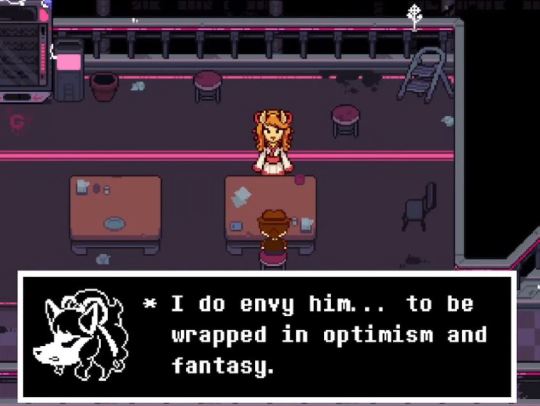
fantasy, not reality (Ceroba is a true realist though)
Starlo only pretends to be this 'tough guy,' his recklessness (I always call it carelessness) is part of the persona. And while I do think some part of him enjoys the fake adventures, it's mostly for show, to lift himself and others around him up, particularly Ceroba, and to feel like someone else.
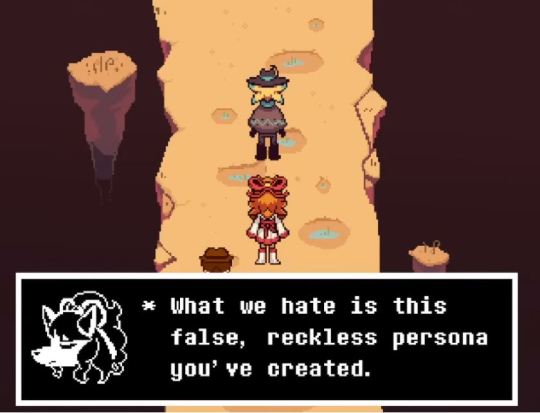
Now... the conclusion I came to was that Star had both Ne and Fe somewhere. The only question I had to ask myself was the order of these functions. In other words, is he dominant Ne/tertiary Fe or dominant Fe/tertiary Ne
The most important question here is: "What is his main motivation?"
Starlo cares a whole bunch about everyone around him. I feel like I've spoken about this so many times already, but he really is the 'papa bear' of the whole group. He makes sure to remind Mooch how they're not bandits, he gave the Four their own nap time, he organizes events, and overall tries to make the Wild East a comfortable place for everyone. Starlo really, REALLY wants to see everyone get along well with each other, and when that doesn't happen... he's deeply bothered by it.
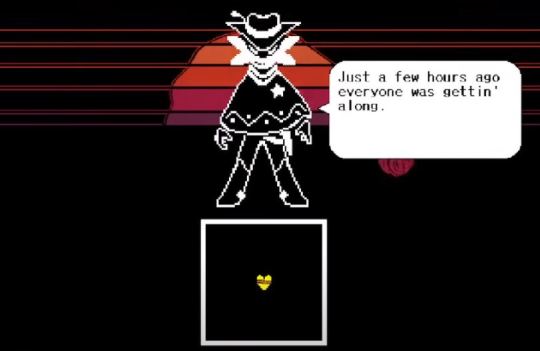

he hates it when there's no harmony and good vibes
Put bluntly, Starlo wants to contribute to his community. He most definitely thought something like this: "If I'm just a farmer, then I can't do anything to help myself feel less worthless, and I can't help other monsters have more hope, either. So, the only thing left for me to do is change most of my personality and be more 'flashy' and 'cool."
Sure, he comes up with creative ideas, but it isn't his main motivation or how he normally acts when he's not 'North Star'. Being all 'extravagent' is the dominant trait of the character Starlo plays (and personally, I think it is a part of Starlo himself, the part he's too afraid to let out if he's his true nerdy self, without the costume and badge and all)
--------------------
ESFJ: thinks in terms of group dynamics, motivates others to get things done, makes decisions that benefit the largest number of people, natural ability to process and deal with their feelings. On the negative side, they can place so much emphasis on social dynamics / emotions that they find it hard to step back and analyze their motives and feelings; thus they can lack self-understanding and/or pressure others into social norms. They use their Ne to brainstorm and for humor purposes; often to entertain others, to think up solutions, and to hypothesize, but their natural ability is not competently and accurately reading between the lines.
--------------------
I'd like to break this down carefully because, holy hell, this is Starlo from A to Z
thinks in terms of group dynamics/makes decisions that benefit the largest number of people - clear as day, that's why he has his posse (although I think this trait of his was underdeveloped during the events of UTY as Star probably made most of the decisions himself without asking the others)
motivates others to get things done

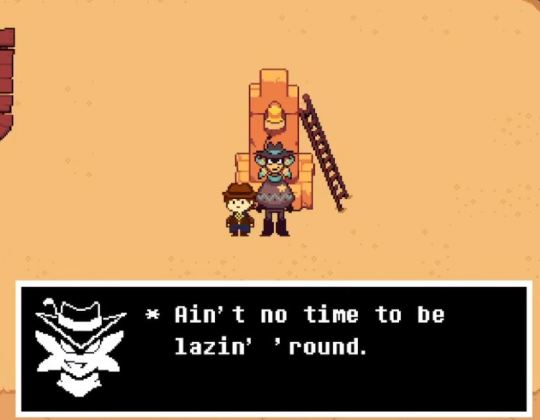
pressure others into social norms - technically his own social norms, also the dress conditions he never used to overlook (I also heard ESFJs have style and care about how they appear to others, ENTPs don't; but maybe this is generalization)

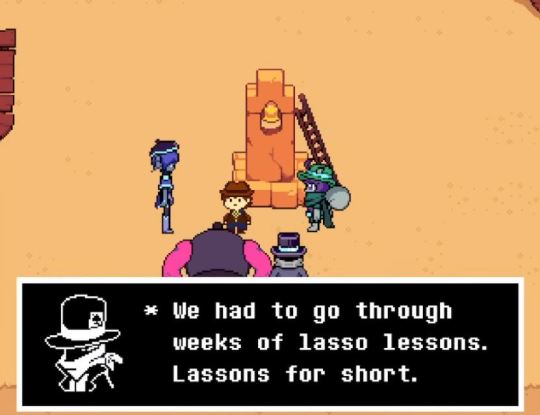
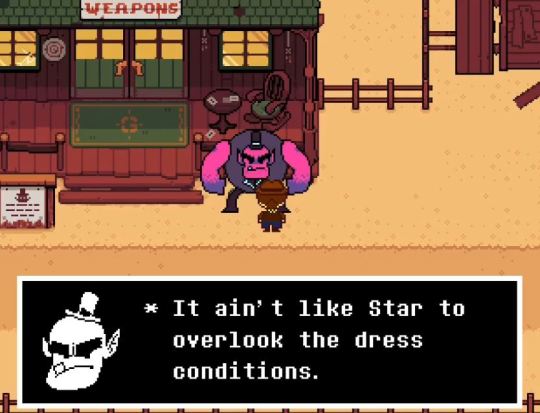
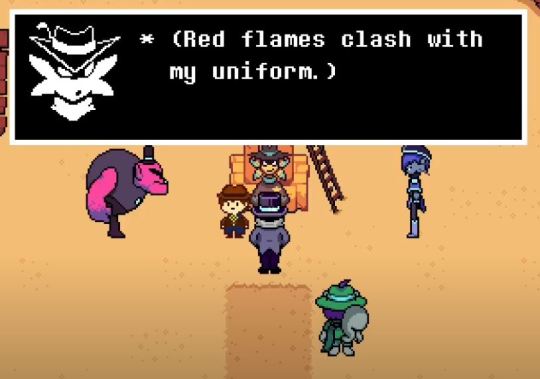
find it hard to step back and analyze their motives and feelings - Star turns to the outside world instead, not inwards at all. That's what makes him an extrovert, NOT because he's friendly and social (although he is)
They use their Ne to brainstorm and for humor purposes; often to entertain others - when I read ENTERTAIN OTHERS it all became clear to me
their natural ability is not competently and accurately reading between the lines - he can't even do it and has to directly ask ⬇️
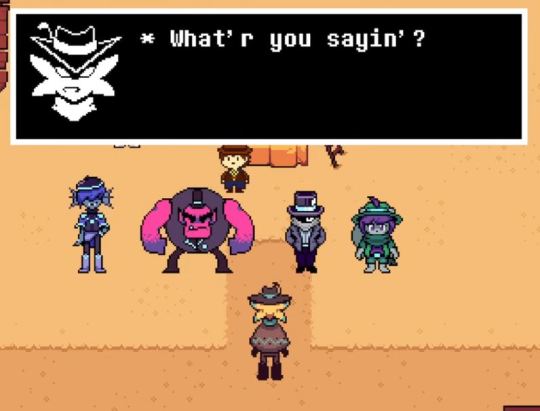
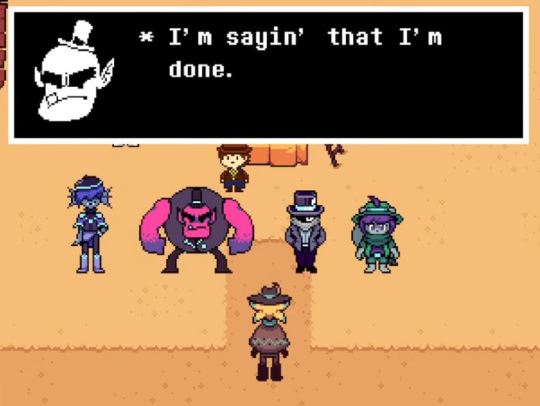
Extra thoughts
What I've also heard about the ESFJ type is that they really REALLY care about their social status/standing when unhealthy, which Star 120% did
It might seem weird that he's a sensor while also being super creative and into ideas, but that's his high tertiary Ne speaking (no wonder it's so high when he's been using it for years)
ESFJs are super charming too, but in a less 'agressive' way like ESTPs (I thought about Dina and Mo, I think they both share this type), or 'witty' way like ENTPs (Sans comes to mind). In others words, Starlo is the 'sweet nerd' kind of charming
ESFJs are bad at dealing with criticism
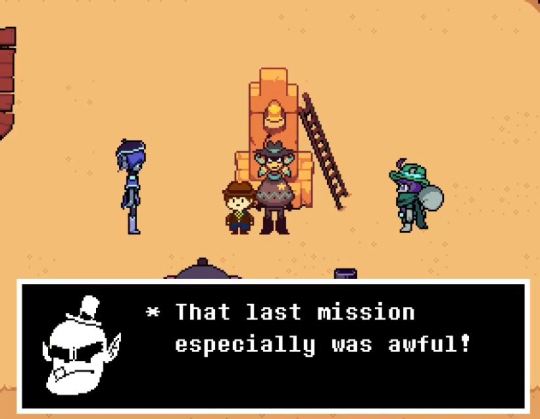
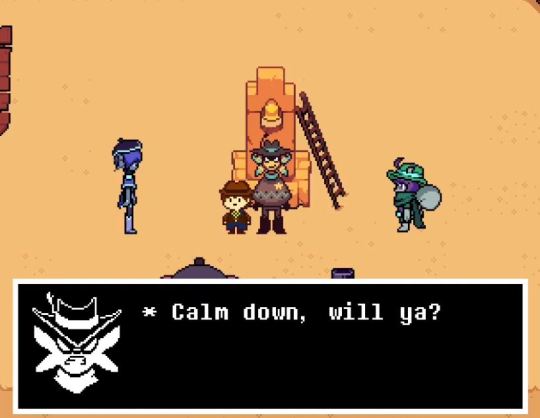
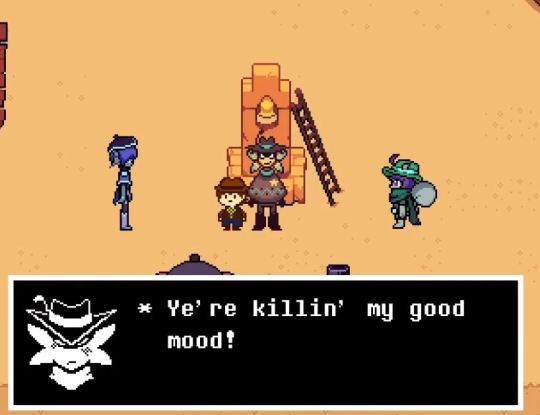
Can become workaholics (ESTPs and ENTPs are more procastinators; again, I don't mean to generalize)
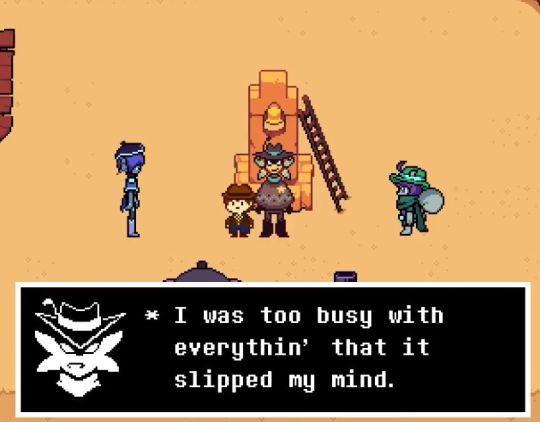
They're clumsy, too (because of the tertiary Ne; unlike ESTPs, who are grounded in reality and most often aren't clumsy thanks to the dominant Se)
Popular people in leadership positions
Excellent planners (I know Star seems like a percieving type, but as I mentioned above, he actually organizes EVERYTHING)


this makes me think Star has a certain routine (judging over percieving)
He remembers little details about things that happened last month (in the past), making me think of his auxiliary Si (and he also remembers what Ed had said about Clover "being the problem")
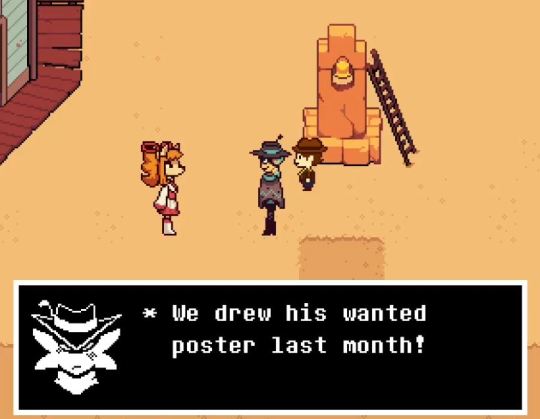
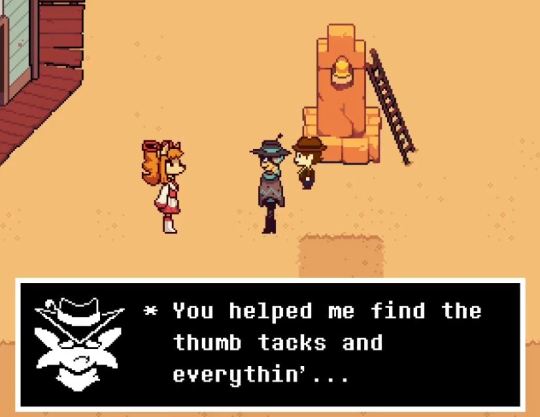
So, what makes Starlo inferior Ti? The guy refuses to go inwards to solve his problems. He doesn't think that the most logical solution to the 'whole gang splitting up' situation is a simple apology, and is extremely self critical. Ti has the potential to disrupt or shatter one’s ego-image. Therefore, unhealthy or immature Fe-doms do their utmost to reject Ti in order to protect their ego-image. What this means for Starlo is that he wants to protect his persona in favor of what makes sense for him to do.
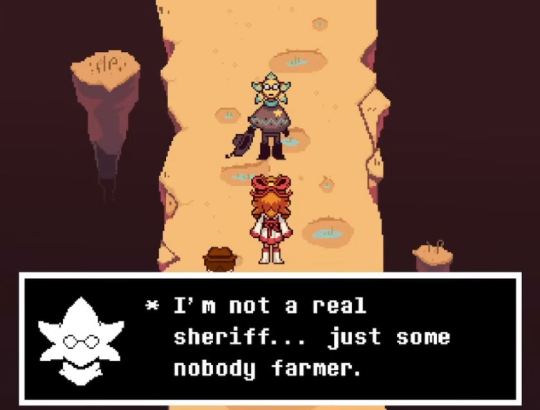
Starlo putting himself down™
Fe will use Ti to construct “rational” explanations to confirm poor judgments about people or relationships. In other words, Fe will develop a maladaptive tendency to misinterpret people’s intentions, see ulterior motives that do not exist, or project their own personal issues onto others. Starlo "logically" thinks that everything was Clover's fault, he's projecting his own insecurities into this situation (playing the victim) and twisting Ed's words (who meant to say that Starlo's favorism OF Clover is the problem, not Clover themself)
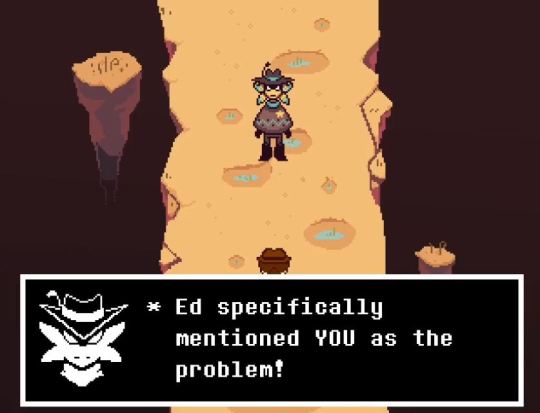
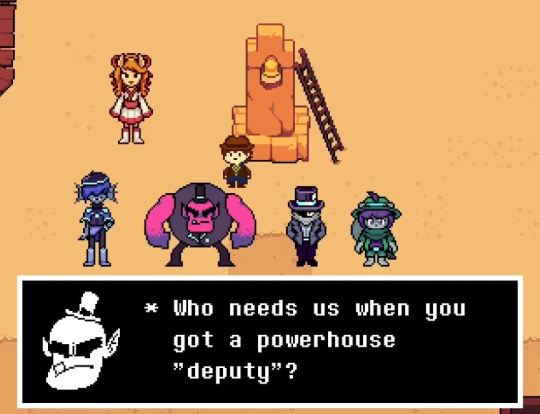
Not objective, but Starlo and Clover LOOK to me like the types I gave them (based on the offical trailers AND how Martlet describes them, that kid has this kind of a cute/warm/naive expression, I don't even know how to explain this but I'm throwing it in anyway 😅)





Then there's Starlo
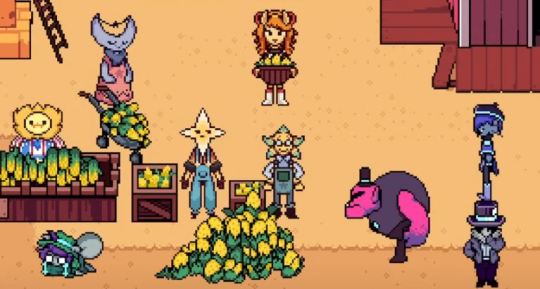
I know the 'North Star' part of him probably wouldn't wanna hear this, but without the persona, Starlo looks and is... pretty normal. No flashiness, no overwhelming charm (it's still there, just more 'humble' & as Ed said, he can make his own fun in the little things). As much as Star might think otherwise thanks to those insecurities, this doesn't mean he ain't special, we all know he is
P.S. I can totally picture him treating everyone with Feisty Sliders & root beer after a long day, just like this guy (who somehow gives me the same cozy, kind vibe as Starlo???)
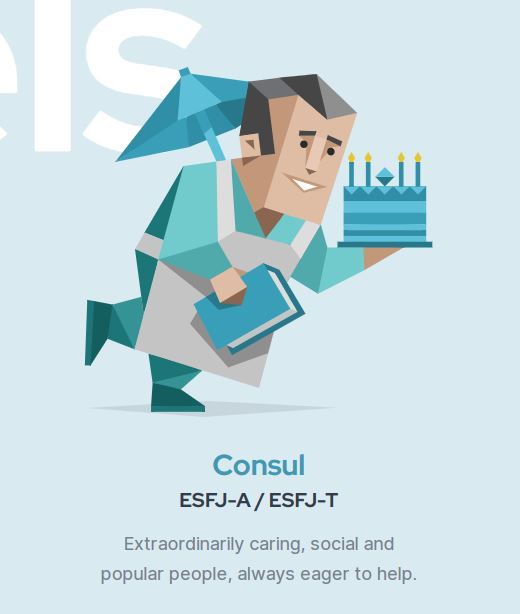
but in all seriousness though, these traits fit Star 💯
#I love this nerd so much I want to squeeze him and kiss him on the cheek#huge sweetheart alert#uty#undertale yellow#starlo uty#uty starlo#starlo#north star#uty clover#clover uty#uty feisty five#character analysis#long post#it also makes sense for his character that Star's not a “cool” mbti but a more underrated one
46 notes
·
View notes
Text
Billy Kaplan / Teen
INFJ

I would say “Spoilers for Agatha All Along,” but if you didn’t filter tags out, you were probably already spoiled by the title of this post.
Dominant Ni (Introverted Intuition) / Inferior Se (Extroverted Sensing)

Billy is interested in exploring the unknown, usually in a controlled way. He knows exactly what he wants from the Witch’s Road, and works toward it, by carefully gathering information and following leads, using his inferior Se. He knows it’s unlikely that he’d make it out of the road alive. He is also able to come to conclusions about the world around him, based on information given to him, and based on his own intuition.
Auxiliary Fe (Extroverted Feeling) / Tertiary Ti (Introverted Thinking)

Even as a child, Billy was always the more emotional twin, and the one who cared about the feelings of the group. In Agatha All Along, he is always making sure everyone in the group is okay, and getting to know each member on a more emotional level. He also has very strong Ti. He is able to come to conclusions very easily, based on his knowledge of spells and his knowledge of the situation.
#mbti#infj#billy maximoff#billy kaplan#teen agatha all along#agatha all along spoilers#agatha all along episode 5 spoilers#agatha all along
23 notes
·
View notes
Text
Alfons + MBTI. long post warning
I think Alfons is an ENTP rather than an ESTP. Before we get started, I will say it for you:
"rou you fucking nerd"
This post was made before his route was released.
The stack for ESTP is:
Dominant Function - Se (External* Sensing)
Auxiliary Function - Ti (Internal Thinking)
Tertiary Function - Fe (External Feeling)
Inferior Function - Ni (Internal Intuition)
*Usually sources say "introverted" vs "extroverted", but stacks are really about how an individual interacts with the world. For the sake of this post, I've labeled them as "external" and "internal".
Dominant Se in ESTP focuses a lot on sensory desires, and that's what he seems like on the surface, but that's not true. Yes, Alfons is action-oriented and doesn't like to express his feelings verbally, but he's not the type to act first and consider consequences later.
Tertiary Fe in ESTP constantly seeks out others' validation and approval. Maybe with those closer to him, but I would generally give this a NO.
I don't have much trouble with the Auxiliary or Inferior functions here. ESTP is really similar to ENTP, so we'll take a look at that.
The stack for ENTP is:
Dominant Function - Ne (Extroverted Intuition)
Auxiliary Function - Ti (Internal Thinking)
Tertiary Function - Fe (External Feeling)
Inferior Function - Si (Internal Sensing)
I have a couple ENTP friends and they are NOT the "charming smartass" trope
Ne, Ti, and Fe are all good at analyzing what makes people tick, which fits.
The main difference is Ne. Ne focuses on novel ideas rather than novel sensations (like Se above). However, Ne tends to be haphazard and scatterbrained... and they usually end up with more questions than answers. Ne is a highly philosophical function.
ENTPs get bored a lot, but when they're paying attention hoo boy
gives up typing
apparently with the thing I'm reading, "having fun" is one of their main values which I guess works but yk alfons is REALLY contradictory
fe with ti also leads entps to prioritize others' wishes over their own which I say is definitely an alfons thing
"inferior function" is their subconscious and si is really careful and traditional which contrasts with the unhinged ne
another important thing is that estp indulges in reality while entp runs away from it. basically, entp lives in their head more
entp is a very intellectual type too... and we see more of alfons' feelings than his thinking, so that's a roadblock
the strangest piece of the puzzle is that both of these types are "open-minded"... which is not exactly something that comes to mind when I think of alfons
might investigate introverted types for him later but here's a bonus estp vs entp quiz from the beloved idrlabs

i am right
yay
12 notes
·
View notes
Text
how to manipulate 16 types by hitting their child function
EXTP: easier to manipulate. praise them. laugh at their jokes. make them think oh they are so fun to be around. but don't try to go deeper unless they want it. make them think you are REALLY having fun when you are with them.
IXTJ: medium level. make them feel oh so special and unique and intelligent and knowledgable. make them think you are genuinely INTRIGUED by them. "ooooh, i want to understand you because you are so mysterious" kinda thing too. ask them deep questions, listen with starry-eyes. make them think you are fascinated by them.
ENXJ: harder as it requires highest sensory effort. their tertiary function is se, so they want to see progress and quickly. so what you need to do is joining them in accomplishing those goals and creating that progress. even though enxjs seem like they are very capable people, they don't really like to do things hard way and grind and grind slowly (this would be isxx's most strong quality). enxjs start really impactfully with the child se but then their energy drops down if results are not satisfactory. so somebody they can trust with "consistent and strong and durable se" will be very valuable to them. impress them with your toughness and determination.
INXP: easiest, since si child. baby them up, pet them, call them good girl or good boy and later, puppy or mommy's best slave. gently caress them. ok this is too romantic and intimate right now. but basical principle applies. don't ever shock them with se, be really nice and gradual and soft while talking to them in an si way, be "really, really nice" to them, buy them ice cream, spend quality time with them. comfort them.
ISXP: hardest? (requires a lot of wisdom.) with the Ni child, these types often have wierd, not-fully-fleshed-out, obscure, out-there, unconventional, edgy ideas. so if you can understand what they mean they will instantly feel a connection with you. they will think you GET them unlike others.
IXFJ: similar logic applies here. Recognize their fragmented Ti insights and see the hidden potential in their logic. Since these types also have Fe auxiliary, affirm their EMOTIONAL INTELLIGENCE!!! ooooh yeah! this applies to all introverts, doesn't it? they seek acknowledgment for their inner refinement, while extraverts look for recognition for their impact or action (especially around their child and hero functions).
EXFP: these types have Te child. they're often the first to take initiative and jump in with a solution when everyone else is waiting around. they’re the first responders, offering the initial, somewhat reasonable solution. to manipulate them, encourage their proactive nature—tell them, "hell yeah, let’s do that!"—and make them feel smart while subtly fixing any gaps or incomplete aspects of their plan without letting them realize it.
ESXJ: finally, these are Ne childs and they want to believe they are creative, they can think out of the box, their ideas improve things etc. the same as above, go oh wow, especially when it comes to their on the spot what if kind of ideas. play along, even if that what if idea fails laugh off and say well that was a good try. like feynman or confucius or somebody once said, we didn't fail, we just found a way it shouldn’t be done.
#manipulation#16 types#socionics#mbti#personality types#jungian typology#entp#intp#esfj#isfj#estp#istp#enfj#infj#estj#istj#enfp#infp#entj#intj#esfp#isfp#toxic title it can easily be named as something like how to connect with each type or something but i gotta be edgy i guess
57 notes
·
View notes
Text
Anon wrote: Hello mbti-notes. Happy holiday and new year. Hope this year is a better year. INTP here. My question is about being stuck in Si loop. I can't seem to be able to get out of it. And it's been a (long) while.
When I was a teenager, I wanted to become an adult, I wanted to get strong, successful, independent, more capable, but now I resent it. There are so many unexpected and unwanted changes and I just can't get used to them. When I look at my timeline, and some other people's timelines, I think to myself that despite all the progresses in science and tech, and all the claims that life has become easier and more convenient, life quality is getting worse.
People around me are getting older, weaker, less beautiful, less capable, needier, more bitter. They age, lose their youth privilege, lose their health, motivation, opportunities, and they keep having more regrets and bad memories, more setbacks, more deaths, more divorces, more lost opportunities than before. Interpersonal and family relationships are getting more awkward and more complicated, people are getting more bitter, colder and more distant, less forgiving, less open, less supportive, more judgemental.
Maybe it's what adulthood has always been for everyone. Maybe it's because of tech and social media. While tech is not all bad and has pros and cons, I can't ignore the cons. Most people around me have become adapted or even somewhat addicted to tech, social media or mobile gaming and seem to enjoy them. They spend more time thinking about their online image or other people's online lives, than building actual memories or doing actual stuffs for the sakes of it. Maybe I'm wrong, but things are getting more complicated. Al and Social media are getting integrated in every aspect of our lives. We have less privacy.
I had tough childhood and teenage years, but all of this makes me think that things were simpler and somewhat better when I was a teenager. My loved ones were younger, healthier, more capable, more hopeful, more positive and forgiving, with better interpersonal and social lives, more friends, more activities, more possibilities and less physical or behavioral issues and less social media influences.
And society seemed more simple, easier, kinder, less complex, more forgiving, less sensitive, more supportive and inclusive.
Plus, I myself was mentally stronger, a bit more self-confident, more hopeful, cheerful, curious, more motivated and less sensitive.
I could never predict these things back then as a teenager. But as I see these patterns over time, I think life, or at least my life is getting worse and worse and more complicated with time. To the point that I have lost my interest in life, live in the state of cynicism, numbness and limbo, and often engage in Si, nostalgia and regressing back to my teenage years in order to seek guidance or calmness.
[(Please delete the following paragraph if it gets your blog in trouble) :
I'm still curious about the universe, cultures and some other subjects. But overall, I have lost my interest in life and living. To the point that I chronically wish there could be a quit button (even when I sleep). I have tried most things, even antidepressants, but they don't seem to make a difference. It makes me think it is not major depression, but realism, or a type of depression related to life situation and unhealthy Si loop. I can see that some aspects of my life are genuinely better now, but that doesn't seem to be enough to improve my mental state.
I keep these thought patterns internal and don't share it with other people, in order to not make them concerned or more depressed, but I sometimes wonder why they rarely think or care about these obvious issues and how they haven't lost interest in living.]
I seem to be stuck in a Si loop. I have lost care for present, yearning and optimism for future, and keep regressing back to past, in order to experience calmness and simplicity.
I have tried to focus on my Ne, my interests and curiousities, in order to bring my past self back, but even when I have the mental and physical energy for that, it only seems to work temporarily and these negative thoughts keep getting triggered and coming back.
How do I stop myself and force myself out of Si loop when I'm somewhat addicted to it?
---------------------
There are two aspects to this problem that you seem to be overlooking:
(1) The key concept comes in the last sentence you wrote, about being "addicted". People opt to stay in tertiary loop or maintain an addiction because they get some kind of "benefit" from it that they aren't willing to relinquish. Just as a drug addict is aware of the health risks but isn't willing to relinquish the highs, as long as you keep believing that the "benefit" is worth the suffering, then change isn't going to happen, is it?
What "benefits" do people get from tertiary loop? Generally speaking, many possible things, including but not limited to:
safety from perceived threats
feelings of comfort or relief (from negative feelings/emotions)
escape from problems and demands for change
"evidence" to confirm underlying biases and prejudices
reinforcement of their negative attitude
protection for distorted, illusory, or grandiose beliefs
a sense of power or control (to cover up low self-esteem)
a sense of dominance or superiority (to cover up low self-worth)
rationalizations for unethical or destructive behavior
ways to excuse or justify repeated mistakes and failures
In short, tertiary loop is an ego defense mechanism. Ego defense mechanisms allow people to avoid facing up to deep psychological problems, usually through some form of distraction, deflection, deferral, or denial.
(2) The second aspect of the problem follows from the first. When people use defense mechanisms to avoid confronting psychological problems, it makes them unable to see just how wrong their thinking is, which allows them to reside in a mental space where they never have to admit they're wrong. This is soothing to the ego. It feels good to always be right, doesn't it? If you really want to exit tertiary loop, the first step is to recognize that there's something very wrong with your thinking.
Notice how your question is about psychology yet you go off on many tangents about society, a mythological past, social media, tech, AI, etc etc? While it's true that those things do have an influence over people, at the end of the day, aren't YOU the one who makes the final decisions about your own life?
It seems you want to be able to claim that some "thing" - something that is not you - is "causing" you to be unhappy. But isn't the truth of the matter more like you are unhappy because you don't care enough about yourself and your life to improve it? And even in the rare event that you feel motivated to improve your life, is it not true that your own lack of imagination continually holds you back?
When you look into the world and judge the people around you and how they live their lives, what you're really doing is looking for inspiration about how you should live yours? And when you don't get inspired, you denounce the world as empty or meaningless? You talk about how the world was "better before", when you were younger, but isn't that because you were new and had a lot to learn, so the world was full of wonder and, therefore, felt wonderful to you? What if you were only born five years ago?
What this shows you is that the problem lies mainly in your own perception - not the world out there. You've essentially become jaded because your view of the world was far too naive and simplistic to begin with. Every time "reality" turned out to be different than what you expected, you fixated on the disappointments and lost more and more of your hopeful attitude. Instead of rising to the occasion to understand complexity and adapt to reality, you rejected reality. And now you're stuck on an island of your own making.
Yes, factually, one cannot deny that there are lots of problems in this world, and they do sometimes constrain us. However, the difference between healthy vs unhealthy NPs is that healthy NPs see problems as opportunities. In other words, it is precisely because we are constantly being challenged by problems that human beings have many chances to exercise ingenuity and learn, improve, grow, mature, and evolve over time. From this perspective, problems ought to be accepted and treated as necessary for living a full life.
You believe "reality" or "society" are bad things that beat people down. You're looking for a scapegoat, so you point your finger and blame whatever for your unhappiness. But the problem largely lies within you and your denial of reality. When human beings get offended by problems and recoil from them, they trap themselves in a mental corner, and problems remain unresolved. As a result, they stop learning, improving, growing, maturing, and evolving - they stop living. From this perspective, wishing for a problem-free life is like wishing for spiritual death.
If you want to call yourself a rational person, you must face up to the facts of life. The facts of life include pain and suffering. And pain and suffering serve a purpose to teach you lessons and help you become the person you're meant to be. If you truly want to change your life, then you have to face up to and take responsibility for the pain and suffering you feel, rather than deflect and blame. Listen to pain carefully because it will tell you exactly what needs to change. And it is your job to make the necessary changes for your own well-being.
Your question is about psychology, yet you talk all around the most important aspects of psychological well-being rather than confronting them directly: feelings and emotions. If you were to read what you wrote as an objective third party, you might be able to see just how alienated and lonely the author really is.
Alienation and loneliness are painful emotions, aren't they? At least, they should be. Do you really allow yourself to feel them, or do you instantly deflect? In order to solve a problem, you first have to be aware of it. These emotions are important because they make you aware of a serious problem of not having a place in the world, of not mattering, of not belonging anywhere.
Every person is a unique individual, so we all have a unique path to take for carving out a space in society. It used to be that your place was forced upon you through family or society. People nowadays have more freedom to choose, so in that way, we are better than the past. Instead of appreciating the freedom and making full use of it, you expect what, for everything in life to just magically fall into place for you? Freedom comes with the responsibility to wield it wisely.
If you want to feel like you matter, that the world matters, that life matters, then you have to DO things that matter in the world. Mattering is not an abstract concept. It is found in the concrete ways through which you relate to the world. But it sounds like you don't do much relating to the world other than spectating and judging it from a distance? Your actions won't amount to much as long as your vision doesn't stretch far enough beyond your own ego.
Things seem different nowadays because they are. Nowadays, people's knowledge of the world is too often secondhand. Excessive consumption of trash media really distorts your perspective and confines your imagination. You are right to indict it, but what are you going to do about it? Couldn't you, at any point, choose differently rather than behave helplessly? Couldn't you put down the devices and go spend more time living a real life in the flesh-and-blood world?
If you choose not to, despite knowing that you should, then it is a problem of underdeveloped Ne+Fe. Don't you find it odd that there are millions of people in this world doing fascinating things that really matter, but you seem to fixate only on the people doing small things you don't like? Doesn't this fixation conveniently confirm your faulty belief that there's nothing good out there for you?
Ultimately, whether or not other people are finding meaning in their activities is their business and irrelevant to your journey, so rambling about it is a pointless distraction. Nobody is forcing you to copy anyone. Your job is to explore and discover a path that suits your unique needs.
Would you rather waste time basking in your critical judgments of the world's problems, or would you rather spend that time actually being out in the world finding opportunities to put yourself to good use in addressing those problems? In other words, do you choose the "benefits" of loop and grip, or do you choose to do the difficult work of forging a real connection to the world? You claim to have done some Ne work, but did it connect you to the world in any substantial way? If not, you've not been on the right track.
#tertiary#loop#addiction#intp#auxiliary ne#si loop#fe grip#inferior fe#mattering#alienation#loneliness#meaning of life#boredom#indifference#apathy#defense mechanisms#mental health#ask
17 notes
·
View notes
Text
idc about harry styles but the dude is clearly an ESFP his Se is dominant his Fi is just obvious ya'll go study the functions better pls i beg you 😭
#he's clearly not an enfj#what the hell tertiary Se???? NO#his Se is really good he's def a Se-dom#edit bc i forgot to mention smth: not everyone who's seen as “charming” is a Fe-dom#his way of being“charming” comes from the fact he is so present in the moment while really feeling his music (Se-Fi) he captivates his fans#he is so “himself” (Fi) people feel inspired#high Fe users captivate people in a different way#well i hope i explained it right i couldn't really express the way i wanted to#and no i'm not saying he's a Se-Fi user bc he dresses in a “weird way”#but y'all can't deny that's still a way of showing he values the material world and the way he dresses and presents himself physically (Se)#and he is not afraid of dressing differently of what's “normal” bc it's important to him to do what he feels like doing#and being authentic and true to himself (Fi)#ok bye nobody asked an analysis
0 notes
Text
INTP Ti - Si Loop
Explanation on an MBTI loop. Not an expert. May change later.
___
Loops in MBTI occurs when a type begins to cycle between their dominant and tertiary function, completely ignoring the auxiliary and inferior. This is mainly caused from stress and can be continous until finally broken.
___
INTP Function stack: Ti - Ne - Si - Fe
When in a Ti - Si loop, INTP is stuck trying to find answers from previous experiences. They can get trapped in constant rumination about the past as they try to find the answer(s) to their issue(s). However, this does more harm than good as they will start to fixate on their past mistakes. Overanalyzing the things they could and should have done will paralyze them into fear and self doubt. Can be very indecisive. Their overthinking will stump their Aux Ne from functioning properly, which can cause INTP to get trapped with certain routines and structures (even if it is not benefitting them). Without the help of Ne, a looping INTP struggles to form new ideas and perspectives. It makes it difficult for INTP to be innovative.
To escape the loop, an INTP needs to learn to utilize their Ne properly again. They can try to put themselves in new opportunities that will get their Ne to function; new opportunities will hopefully get INTP to explore new ideas and concepts. Brainstorm possible solutions to get their gears going. Learn to be more accepting of their own mistakes and failures, be more self compassionate.
___
MBTI Notes
#mbti#intp#mbti intp#intp personality#ti - si loop#mbti loop#typology#cognitive functions#myers briggs type indicator#myers briggs#intp loop#introverted thinking#extroverted intuition#introverted sensing#extroverted feeling
85 notes
·
View notes
Note
Which MBTI types do you reckon would be the best liars?
-I'm new XD feel free to name me as you please ;)
you can be "pirate anon" bc i've never heard someone say "reckon" before haha
🥇 enfjs are the best liars. period point blank.
🥈infps and enfps come close. in general having fi means they have a little bit more control over their emotions and feelings. i don't think they could hold a lie for a long period without ultimately breaking, but they're very good at making small ones to save themselves in the moment. having ne-fi makes them pretty good at coming up w them on the spot.
🥉 estps have tertiary fe which comes as a tool to them, and combined with their se basically makes them a powerhouse for telling lies and reading/understanding others.
🎖️honorable mention: intp, istp, isfp, and istj are the best lie detectors, or basically the best "bs" detectors. they're the type of people that see someone lie a certain way in a movie and then see it irl. they also have sm awareness of things going on that they realise when someone's story doesn't fit in place
best fictional characters award: i know that you are all waiting for me to say infj 😔...yes, i admit, they are the best liars...but only at their most EXTREME points !! 😭😭 i DO NOT see a joe goldberg or johan liebert walking around on the streets...i don't think the average infj is walking around with the capability of will graham. but overall infjs have the coolest characters when it comes to lying 🤷
#mbti#infp#infj#isfp#entp#intp#enfp#entj#intj#enfj#istp#mbti memes#mbti personailty#personality types#16 personalities#mbti types#mbti personality#esfp#isfj#istj#estj#estp#mbti personality types#mbti personalities#enfj things#enfj personality#estp personailty#infp personality#infp memes
49 notes
·
View notes